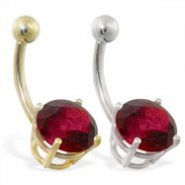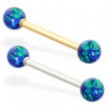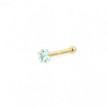14K Gold belly ring with large 8mm Garnet
- Length: 7/16" (11mm)
- Gauge (Thickness): 14 (1.6mm)
- Type: belly button ring
- -: priced and sold individually
- -: Made In USA
- -: Customization available, contact us.
- Stone Size: 8mm
- Gem Type: Garnet
- Stone Creation Method: synthetic
- Threading Type: Externally Threaded
- Gem Setting: Prong Set
- Gem Creation: Synthetic
- Gem Shape: Round
- Gem Color: Red
| Click on the picture to see a big picture and description of the body jewelry you are interested in. | |||||||||
|---|---|---|---|---|---|---|---|---|---|
|
14K Gold straight barbell with Blue...
$39.99
14K Gold straight barbell with Blue Green opal balls
|
14K Gold belly ring with dangling...
$75.00
14K Gold belly ring with dangling pink AB swarovski crystal heart
|
14K Gold Nose Screw With Round...
$24.99
14K Gold Nose Screw With Round Black CZ
|
14K Real Yellow Gold Nose Bone...
$13.99
14K Real Yellow Gold Nose Bone With Square Gem, 20 Ga
|
||||||
LIP & LABRET
The Labret piercing is usually made centrally approximately 3/8» below the colored edge of the lower lip, through or just above the cleft of the chin. Lip piercings can be made anywhere along the outside of the lips. Because of the nature of the tissue the colored area of the lips should not be pierced. If a ring is chosen the piercing should be placed so that there is no pressure against the teeth; pressure will cause the piercing to migrate.
Because of the nature of the mucous membrane tissue on the inside of the lip the piercing may close if it is left empty, even after the piercing has healed.
Labret studs tend to cause deterioration of the inside of the lip; often a niche forms under the disc. Labret jewelry usually causes at least some gum erosion where the disc rubs the gums. Labret jewelry can also cause damage to tooth enamel if the jewelry rubs against the teeth.
L-shaped Fishtail Labrets are designed to reduce gum erosion. The «tail» is intended to stay in place in the indentation below the gumline; the piercing cannot be placed too high. The presence of a large frenulum may impede ideal placement for a fishtail.
Some piercers prefer to angle the Labret piercing so that the disc is above the teeth. This placement will avoid gum erosion but may cause the wearer to inadvertently bite down on the jewelry while eating and speaking, resulting in chipped teeth.
Initial jewelry: Captive bead rings in 18 to 10 gauge and 5/16» to ½» in diameter; the ring should be large enough to allow for swelling and should not hug the lip; a smaller ring may be worn when healed. Labret studs in 16 to 10 gauge; the stud should be 1/8» longer than the width of the piercing to allow for swelling; internally threaded jewelry is strongly advised for this piercing as external threads can tear or irritate even a healed piercing; the edges of the disc should be smoothly rounded. Fishtail Labrets in 18 to 10 gauge; should be made of a flexible metal (gold, annealed or ¼ hard steel) so that is can be adjusted to fit your mouth comfortably.
If the piercing is abused while the piercing is healing an 18 or 16ga ring may tear the inside of the lip or create scarring on both entrances.
Labret jewelry will collect plaque, especially in the crevice between ball and bar. Plaque traps bacteria and can cause the jewelry to have a bad odor. Daily use of an anti-plaque rinse is suggested to prevent plaque build-up. To remove a build-up of plaque remove and soak jewelry in an antibacterial denture cleaner following the package directions.
While smoking may be irritating but not necessarily damaging to a new piercing the use of chewed tobacco products is discouraged as the use of chewed tobacco has been attributed to oral cancers and lesions.




